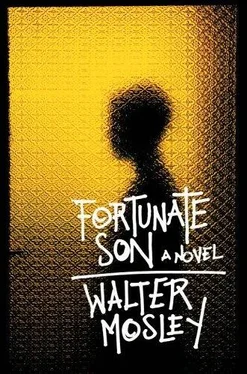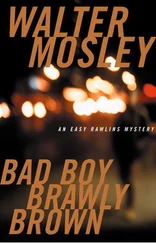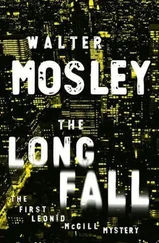“Uh-huh.”
“That’s wild, man. And nobody nevah knew?”
“Not until Pedro killed himself and I tried to stop him and fell off the roof. Then they knew... about me not goin’ to school anyway.”
Michael Cotter loved a good story. He had been in the army for a spell, as a sniper. He told Thomas that they had him “all ovah the niggerlands from Afghanistan to Sudan, from Argentina to North Korea.”
“And you shot people?” Thomas asked.
“Oh, yeah, man. Sometimes, though, they’d put a twist on it.”
“Like what?”
“Sometimes,” Michael said, “when they didn’t wanna kill somebody but just shake him up, they’d have me shoot his wife or young child. Sometimes I’d just wound a dude so he’d miss a meetin’.”
Most of the other smokers liked Cotter, but they didn’t believe his stories.
“He just a blowhard,” Parker had said to the other smokers one day before Cotter had arrived. “I mean, he tell a good story all right. And I believe he had some time in the armed services. But the United States government ain’t nevah gonna have no sniper shoot no child.”
“I’ont know,” Miranda said. “Maybe not a white child, but if it was some little black boy or Arab girl they might not care.”
“What do you think, Lucky?” Ben asked Thomas. “You the one he talk to the most.”
“He prob’ly did all that,” Thomas said.
“Why don’t you think he lyin’?” Penelope asked the youngest smoker.
“People lie to impress people,” Thomas said, paying very little heed to the words as they came out of his mouth. “When they lie they sneak a look to see if you’re impressed. But Cotter don’t care. He just talkin’. I think he did alla what he said. All of it and more.”
Eric was happy to have his brother back in his life. He still lamented Christie’s death, still felt guilty about it. But he didn’t feel alone with Raela as he had with Mona’s mother. If he was sick she nursed him and never got a sniffle. When they went skiing together he broke his leg, and she didn’t even sprain an ankle. And she was forever surprising him with her views of the world and her conviction that they were meant to be together.
“But do you love me?” Eric asked her one day.
“Sure,” she said.
“But I mean really, deeply.”
“That’s not the way you and I think,” she replied. “I’d kill for you if I had to. I’d die for you too. Isn’t that enough?”
“When I was in New York I slept with a woman, a stockbroker named Connie.”
“So?”
“Does that make you jealous?”
Raela gazed up at a spot somewhere above Eric’s head.
“If I smelled her on you I might get violent,” she speculated. “Yeah. If I smelled her on you, you might have to hide for a while.”
“But you didn’t smell her?”
Raela pressed her face against his chest and inhaled deeply.
Then she exhaled and said, “All I smell is me.”
Eric was reminded of Ahn’s story about the tiger. Looking upon this girl and remembering that, the young man felt real fear for the first time that he could remember. It exhilarated him, made him shiver. Raela put her arms around him and pressed his head to her breast. From there he could feel the strong beat of her heart and somewhere, far away, the muted thudding of his own blood.
“What we have is what we need,” she said with conviction.
Eric thought that he was directionless in this jungle of a girl, directionless but not lost.
A year passed for the brothers. Thomas went twice to New York and found Clea there waiting for him. In that year he had not cut himself or fallen down, nor was he stopped by the police even once. Every day he woke up early and sat with his stepfather. They read the newspaper and talked about the events in the world. Minas seemed infinitely interested in Thomas’s ideas and point of view.
“You’re so much like your mother that it’s uncanny,” Minas said to Thomas.
“She was the kindest person in the world,” Thomas would say.
“Yes, she was,” Minas agreed, “and as long as you are here she will never be gone.”
Eric relaxed. He experienced a profound love for his daughter now that he wasn’t afraid he’d do her harm. They’d spend hours playing games and going to amusement parks and the zoo.
His feelings for Raela never changed, but this didn’t bother him. She was his sail, he thought, and he was her ship. They were ancient archetypes instead of real people.
Sometimes when thinking this, Eric became terribly sad. He’d see himself like a reflection in a mirror, unable to reach out into the world of flesh and bone. But at those times Raela would come to him, and he realized that even in isolation he wasn’t completely alone.
And he also had Thomas. The brothers saw each other at least three times a week.
“You know, the more I think about what you said,” Eric was telling Thomas at the stone animal park, “the more I think that it’s true.”
“What?”
“That you’re the one who’s lucky. You loving life makes you like that. There’s nowhere you can go where you don’t feel at home.”
“Like a snake,” Thomas said, happy to continue the conversation he’d had so many years ago with Bruno. “A snake can go anywhere he wants to.”
“See that? If somebody called you a snake, even that would make you happy. You can’t get much luckier than that.”
Michael Cotter was driving Thomas every day by the end of the year. Thomas had talked to Michael almost as much as to his brother or Clea. He’d told him about the alley parrot chanting “no man” and Alicia in her cinder-block tomb. He talked about his years as a drug dealer and in the youth facility and as the child husband of Monique and de facto father of Lily.
“I called Clea at lunch, and she told me that she applied to UCLA and that they accepted her,” Thomas said to Michael on their ride home after work one day. “She asked me if I wanted her to come out here and live with me.”
“And what did you say?” Michael asked.
“I said absolutely.”
“Congratulations, my man.”
“Thanks. You know, she says that after she graduates, we’ll figure out whether or not to go back to New York.”
“Hey, man, that’s great. We should celebrate that. I got to see somebody today, but why don’t we have a drink tomorrow to toast you and your girlfriend.”
“Okay. Great.”
That night the whole family got together to celebrate. Eric, Mona, Raela, Ahn, and Minas were all there. Michael came with Doris. Michael had gone to live on a date farm in the desert. He’d grown a beard and dropped out of college. He no longer communicated with Raela’s parents (that’s how he began to think of Kronin and Maya). Doris drank too much sometimes, and when she did she got rowdy. But Michael said that he loved her, and Raela spent weekends with them once a month.
“It’s been a long journey, Tommy,” Minas said, holding up a glass of cognac. “But I think you’ve made it through.”
They all drank and cheered.
Raela played the piano for them, and Ahn sang a Vietnamese song that she remembered from her youth before coming to America.
Sometime late in the evening, Eric took his brother into the garden.
Eric seemed older. There could often be seen a slight smile on his lips. His shoulders sagged slightly, and he paid a lot of attention to people around him.
“You think you’ll marry Clea?” Eric asked.
“She’s too young,” Thomas said. “She just wants to go to school and have some fun.”
“Will you live together?”
“Yeah. Maybe we’ll get a place near Fontanot’s or some kinda student housing thing.”
Eric put his arms around Thomas, kissed his cheek, and whispered, “You’re my brother, Tommy.”
Читать дальше












